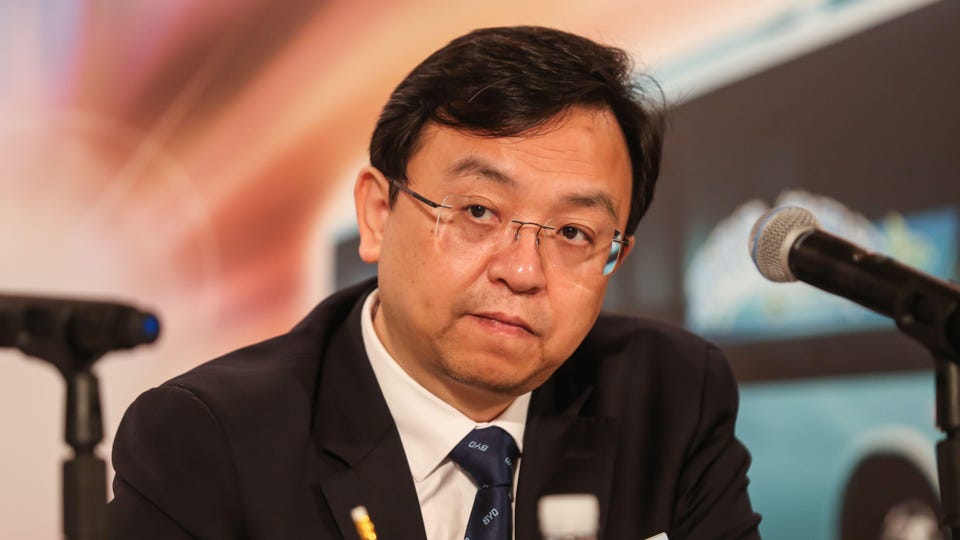Wang Chuanfu , the cofounder and chief executive of BYD, saw his wealth tumble by almost $2 billion after Warren Buffett ’s Berkshire Hathaway trimmed its stake in the Chinese electric car maker for the first time since investing in the Shenzhen-based company in 2008. Shares of BYD tanked amid speculation that more stock sales could be on the way. The Hong Kong-listed BYD plunged almost 12% on Wednesday after a regulatory filing to the city’s stock exchange showed that Berkshire Hathaway has reduced its ownership to 19.
92% from 20. 04%. The Omaha-based investment firm gained $47 million when it sold 1.
33 million shares on August 24 at an average price of HK$277 apiece, according to the filing. Kenny Ng, a Hong Kong-based securities strategist at Everbright Securities, says the possibility of further sales is high. Speculation that Buffett’s firm would cut Berkshire Hathaway’s position in BYD has been mounting since last month, when a tranche of shares matching the size of the U.
S. firm’s holding in BYD entered Hong Kong’s Central Clearing and Settlement System. “Warren Buffett bought into the company when it was trading at only around HK$8 per share, ” Ng says.
“BYD’s current value is not cheap, and Buffett is making a very good return from this investment. ” Headed by billionaire Wang , BYD now has a forward price-to-earnings ratio of 74 times. Berkshire Hathaway, which invested roughly $230 million to acquire 225 million BYD shares more than a decade ago, has seen the Chinese company grow to become a leader in the country’s booming electric car market.
The value of the rest of Berkshire Hathaway’s holding, in the meantime, has surged to $6. 6 billion based on the stock’s current price. And just two days ago, BYD reported stellar results for the first half of 2022.
Thanks to a highly integrated business model , where the company produces its own batteries and other auto parts used in electric cars, it was able to shrug off lockdown pains and keep manufacturing lines across China humming. The company sold 641,350 cars for the first six months of the year, a 315% surge from the same period a year ago. Revenue jumped 65.
7% year-on-year to 150. 6 billion yuan ($21. 8 billion), while net profit soared by more than 200% to $530 million.
Vincent Sun, a Shenzhen-based analyst at Morningstar Equity Research, says his view on BYD’s fundamentals remains unchanged, and he has a price target of HK$315 for the stock. Sun also mentioned that when Berkshire Hathaway reduced its stake in PetroChina back in 2007, the firm did so in multiple rounds over a period of several months. Berkshire Hathaway may choose to cut its holding in BYD by a small percentage overtime, says Dickie Wong, executive director of Hong Kong-based Kingston Securities.
But the company may also choose to retain part of its ownership instead of dumping the entire position, as China’s EV sector could well continue to grow. “BYD is one of the key players that can compete with Tesla,” Wong says. “They [Berkshire Hathaway] may only sell partially at this stage.
” But any sale would continue to hurt investor confidence. “Berkshire Hathaway’s ownership reduction doesn’t necessarily mean BYD’s value has peaked,” says Everbright Securities’s Ng. “But it is a long-term value investor, and its sale for sure exerts a negative impact on market sentiment.
” Wang cofounded BYD as a battery maker in 1995, and ventured into the auto sector in 2003. He currently holds a 17. 6% stake in BYD that makes up the bulk of his of $22.
2 billion fortune, according to Forbes ’ real-time data . .
From: forbes
URL: https://www.forbes.com/sites/ywang/2022/08/31/byd-chief-suffers-2-billion-wealth-drop-after-warren-buffetts-berkshire-hathaway-cuts-stake/



